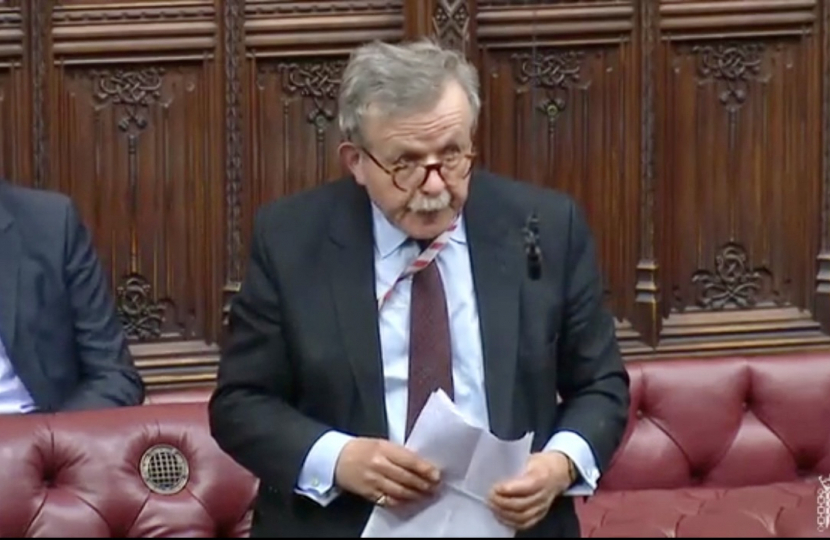
As is customary, the Lords allocated several days to its debate on the Gracious Speech delivered by the King on 17 July. Alistair Lexden made his contribution on 19 July when all speeches were limited to five minutes. He covered two subjects: Labour’s attack on independent schools which at the moment is his main preoccupation in politics, and the action needed to tackle late-diagnosed osteoporosis.
I declare my interest as a former General Secretary of the Independent Schools Council, and the current President of the Independent Schools Association, one of the Council’s constituent bodies, whose 670 member schools make up a substantial proportion of the Council’s total of 1,400 schools..
From that declaration stems my principal purpose in this debate: to impress upon the Government the deep concern that has been created by its proposal to slap VAT on independent school fees.
The concern is not confined to families who have children at independent schools, or to those who run the schools. There is great apprehension everywhere about the almost inevitable consequence: the need for additional places in the state sector for pupils whose independent schools will be unable to remain in existence.
It seems to be the Labour Party’s contention that independent schools will not need to pass on the VAT charge to parents; they will be able to absorb it. This is not so. Only a handful have the endowments or reserves that would enable them to pay it themselves.
The overwhelming majority of independent schools are small schools, with some 300 pupils on average, which rely on each year’s income to meet their costs. They will, with great reluctance, have to pass on the new VAT burden to parents—and many cases parents will be unable to pay the increased fees.
The new Government has the wholly laudable aim of recruiting the additional teachers we need so badly. But it is far from certain that the imposition of VAT on fees will assist them significantly, if at all, in meeting that objective.
The additional resources that state schools will need to teach more pupils could absorb much of the revenue gained from the VAT charge, perhaps even exceed it.
It is on this absolutely central point that we need the independent assessment that the Office for Budget Responsibility will be providing.
I hope the Government will publish the OBR’s advice in full at the earliest opportunity.
It should form a key part of the discussions that they will need to have with the Independent Schools Council on the implications of the policy, particularly where special needs pupils are concerned. Some 90,000 of them could be forced out of independent schools which teach them so well.
Make no mistake: the Council will want to work with the Government to help raise standards, train teachers, extend opportunities for our young people.
How vividly I remember my years at the Council at the start of the last Labour Government when so much invaluable co-operation developed with the Education Department, particularly when the noble Baroness, Lady Morris of Yardley, was a Minister, and how much I enjoyed our association.
One enduring result was the creation of joint state/ independent school partnership projects. They have grown and grown over the years. Music, drama, arts, the teaching of shortage subjects are just some of the many beneficaries of the great work that state and independent schools are doing together to their mutual benefit—I stress mutual benefit. It must not be jeopardised.
*
One of the consistent themes of health debates in the last Parliament was the Government's lamentable failure to make the extremely modest investment necessary to ensure universal access to fracture liaison services in England.
It is vital to tackle the scourge of late-diagnosed osteoporosis, the fourth leading cause of disability and premature death, as my nobe friend Lord Black of Brentwood, who cannot be in his place today, has frequently pointed out.
The heavy price of that failure was thousands of lives lost, innumerable people living in unnecessary pain, and countless numbers of both sufferers and their carers taken out of the workforce at a time when they are badly needed.
Thanks to the success of the Better Bones campaign, spearheaded by the Royal Osteoporosis Society, we now have a commitment from the new Government to achieve full coverage of fracture laiison services across England by 2030.
To ensure that Government action in this area is as effective as possible, two initiatives are needed.
The first is a Transformation Fund, foreshadowed under the last Government but never delivered, to pump-prime new and improved FLS until they break even within two years. Could the Minister confirm that the work undertaken by officials in the last Parliament will be taken forward to establish such a Fund ?
The second initiative is the appointment of a National Specialty Adviser to ensure strong, specialist leadership across Departments and agencies , and to spread best practice.
Could the Minister tell us when we might see such a vital appointment, which will be crucial in turning well-intentioned commitments into tangible results to the great benefit of our country?

